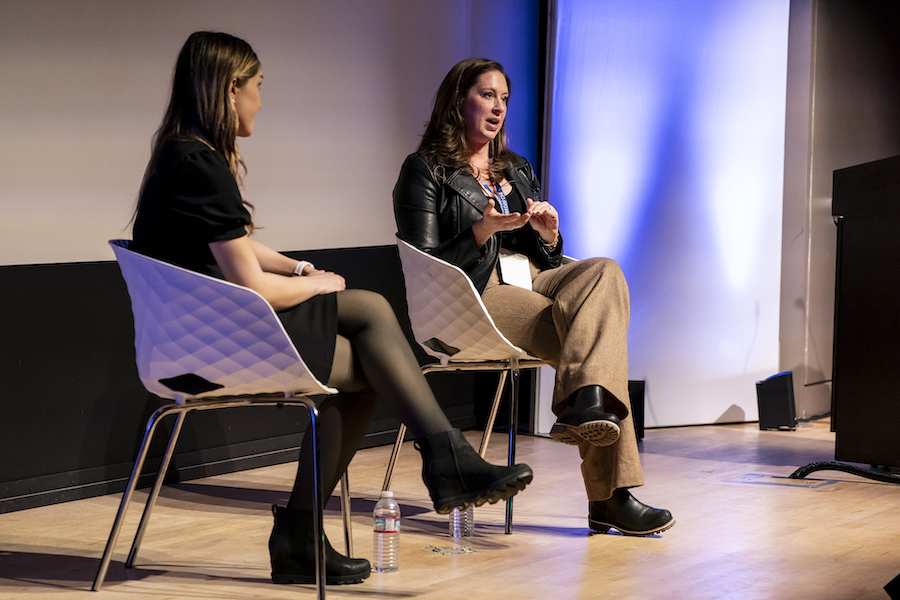Transporting Your Corporate Values and Culture to Widespread Workplaces


How do you help a distributed workforce succeed in a time of flux and uncertainty? How do you get people who work in different places and different time zones to work well together? And how do you know which people and teams need to be in person most of the time to function best? Wayfair is trying to figure that out.
“Initially, there was no strategy on what people were located where,” said chief people officer for tech, Cathy Peterman, at From Day One's conference in Seattle. Peterman was interviewed by Bridget Chavez of KIRO 7 News in the opening fireside chat session. Just before the pandemic, the company was trying to revamp 20-year-old computer architecture and hired where they could. “It was a free for all.”
Then, with the pandemic, most of the 16,000 global employees were working from home, at least part of the time, with tech largely fully remote. But remote working isn’t the Wayfair culture. Return to office was key to who they are.
Initially, they didn’t think they could ask tech to return to the office, they were all over the world, talking to each other on conference calls. It didn’t make sense. But most of the non-tech force is in Boston. “We told them to come back Tuesday through Thursday. You can imagine the discord. Why is tech special? This isn’t fair.”
Six months later, they are trying again. “Some want to come back in; they want the connection. But some don’t. They want to code from where they are with their headphones and their dog. Some started from home during the pandemic and just don’t have the connection to others in the company.”
The heated debates that have swirled around these decisions have been ongoing in part because people didn’t feel heard. “I made a mistake the first time. I was listening, but I didn’t tell them what I was hearing. There was some backlash.”
Be Open With Decision Making
Transparency might have eased the transition. “If they understood the rationale behind the decision, and what their peers were saying about in-person work, it might have gone more smoothly,” Peterman said.
Wayfair has done two RIFs recently. “You can imagine the pain our employees feel. But it is the right thing to do for the company.” Still, it can cause a hit to the trust she is trying to build when people feel blindsided by decisions, whether it’s a return to office policy or the potential for layoffs.
Peterman said she is trying to bring more vulnerability and transparency to Wayfair. “I’ve had to become more caring and compassionate.” And honest. She admitted her previous mistakes regarding return to office at an all hands meeting and had people reach out with thanks. “I had one person tell me they had never heard an admission of error in that public forum. We will make more mistakes. We are human. But bringing visibility and vulnerability will go a long way.”
Retaining Talent in Turbulent Times
Peterman knows that some people won’t like some of the changes in the company and will want to leave. But retention of key talent matters, perhaps especially in rocky times. “We are focused on the work and the people. We aren’t building AI or other cool tech. We are e-commerce. When we talk to them in interviews and retention conversations, we talk about them being part of building a new future for Wayfair. We key in on that.”

There is also a focus on the culture of collaboration and caring. That feeds into the rationale for being an in-person company. “We build a caring environment through relationships with each other. And we think it’s easier to do that when we are together.”
When people leave or there are layoffs, she said they try to emphasize the opportunity to grow skills with the remaining team members. For example, when the DEI partner for technology left, the position wasn’t filled. Now it is on the rest of the team to drive those efforts forward. “We aren’t experts. This is an opportunity for us to take on new skills.”
As a parting piece of advice, Peterman said that HR leaders should remember that they, too, are human. “We have underestimated the toll the last couple years has taken on us. We talk about RTO, caring about employees, the fight for talent, and all the things we had to lead our companies through. I’m tired. I’m still energized but I’m tired. I talk to peers in different companies, and I think we need to come together more to support each other and share.”
Lisa Jaffe is a freelance writer who lives in Seattle with her son and a very needy rescue dog named Ellie Bee. She enjoys reading, long walks on the beach, and trying to get better at ceramics.
The From Day One Newsletter is a monthly roundup of articles, features, and editorials on innovative ways for companies to forge stronger relationships with their employees, customers, and communities.